The Importance of Employee Retention in the Hospitality Industry: Strategies for HR Professionals
.png)


 Cut onboarding time
by 60%—here's the
Ultimate Checklist
that helped do it.
Cut onboarding time
by 60%—here's the
Ultimate Checklist
that helped do it.

Widespread employee turnover is a costly problem for employers in the hospitality industry. This guide will provide you with strategies to improve the working environment and dedication of staff, helping you retain your workforce and boost employee engagement in the hospitality industry. We'll explore employee retention strategies for 2023 that can significantly impact your business's success.
The term "employee retention" refers to the ability of a business to work with the same set of hospitality employees for an extended time. The opposite term, "employee turnover in hospitality industry," describes the rate at which employees leave a place of work. When comparing retention rates by industry, the hospitality sector has an annual turnover rate of 73.8%, with over 6% of staff leaving posts every month. Many business owners and managers encourage employee retention by creating a comfortable work environment that shows employees they are valued.
The high demands of the hospitality industry make employee retention crucial. This industry includes restaurants, hotels, resorts, and other service-oriented places of work. They require high levels of expertise to perform labor-intensive jobs and deliver high-quality customer service. If a business has a high employee turnover rate, it can disrupt the flow of operations and leave customers feeling dissatisfied. While in the restaurant business, the staff turnover rate is relatively lower compared to other hospitality sectors, it's still a concern for many establishments.
When a business in the hospitality industry has strategies in place to encourage employee retention, they are more likely to be successful in creating a workforce that delivers exceptional customer service every time. Check out our employee app for your worker engagement and improved employee communications hospitality.
Employee Retention Strategies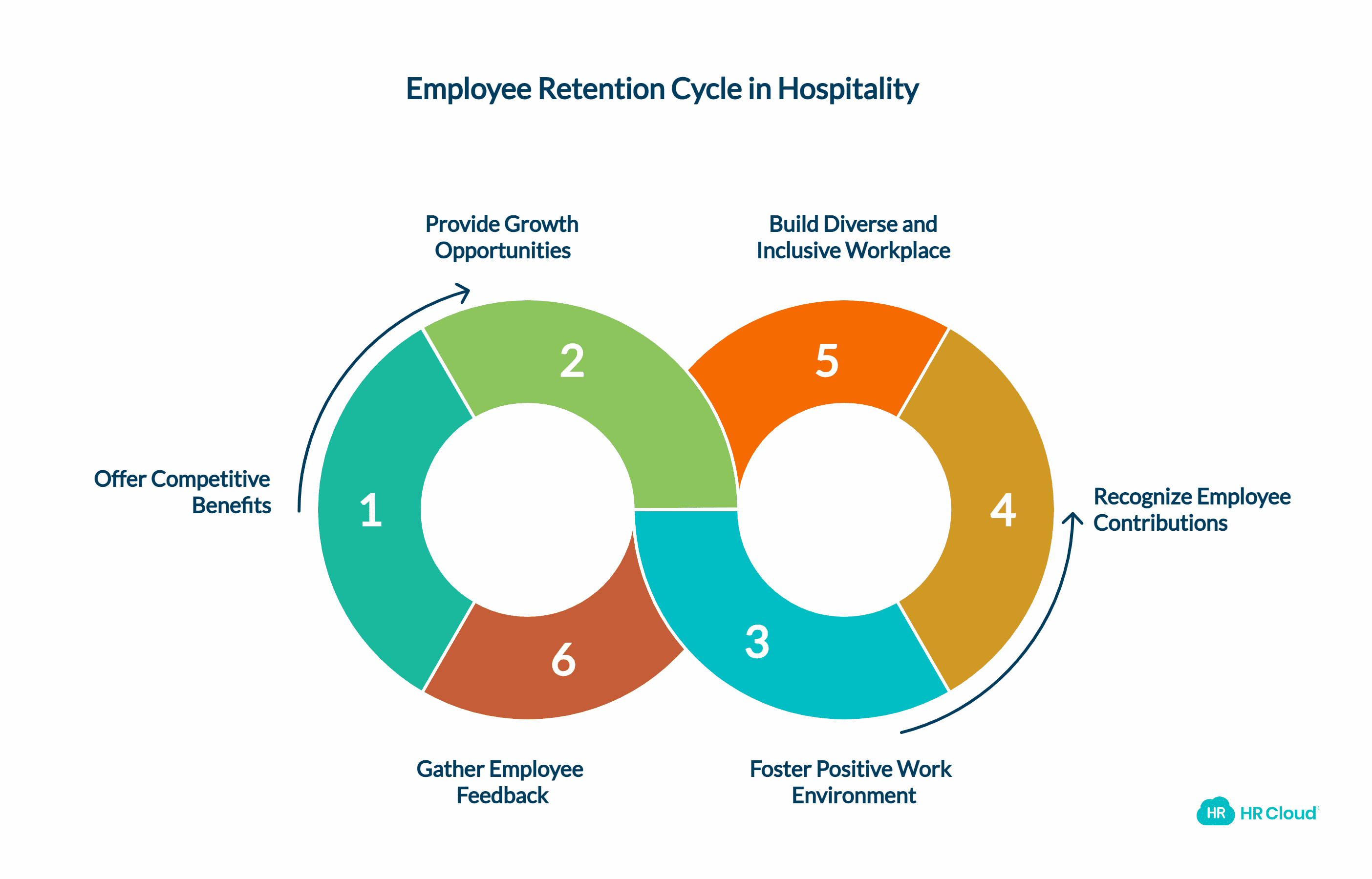
Implementing strategies for employee retention is critical for business success in the hospitality industry. Let's talk about practical ways HR professionals can encourage an environment conducive to employee retention and boost employee engagement in the hospitality industry
Competitive Benefits and Compensation
If you want top talent for your hospitality business, you must offer employees maximum benefits packages and competitive compensation. When an employer provides competitive wages and benefits, they are likely to see a higher retention rate among their employees. These benefits include health insurance, paid time off from work, and help later in retirement. To create a competitive benefits package and ensure you offer wages above the market standard for your employees, conduct regular research on the current averages.
Growth Opportunities for Employees
The hospitality industry has plenty of room for growth for employees. A company should always offer training programs and professional development opportunities to encourage employees to learn and grow professionally. Furthermore, when employees have a clear path to career advancement, they are more likely to set personal goals and work harder to climb their career ladder. Someone is more likely to continue working for you when they know their career development is supported and encouraged.
HR professionals can suggest educational courses for career advancement through hospitality graduate programs to encourage employee retention. Businesses can establish partnerships with institutions to provide employees with access to these educational opportunities. Additionally, implementing leadership development programs and mentorship programs can significantly enhance employee retention and satisfaction. When managers demonstrate care for their success and work-life balance, they are more likely to stay employed with them. Setting clear retention goals, such as reducing turnover by 20% in a year, can help focus these efforts.
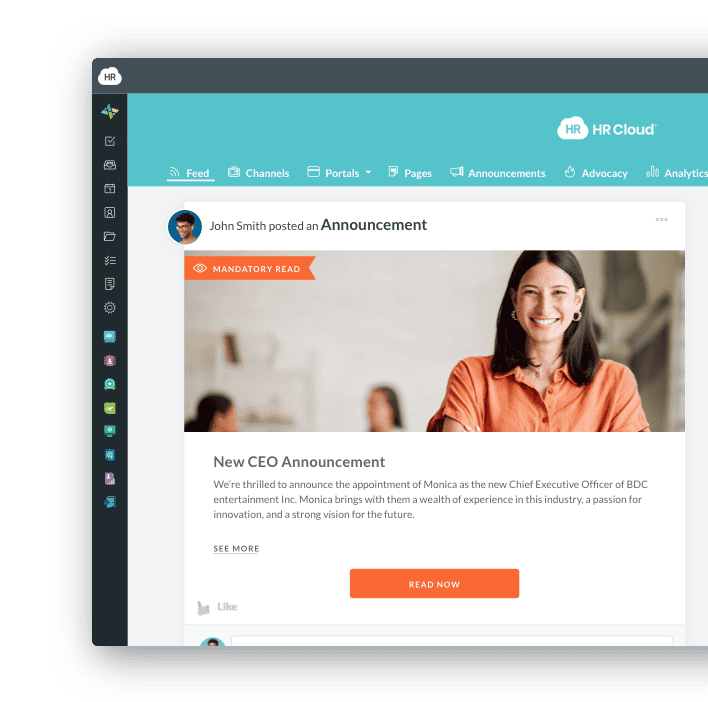
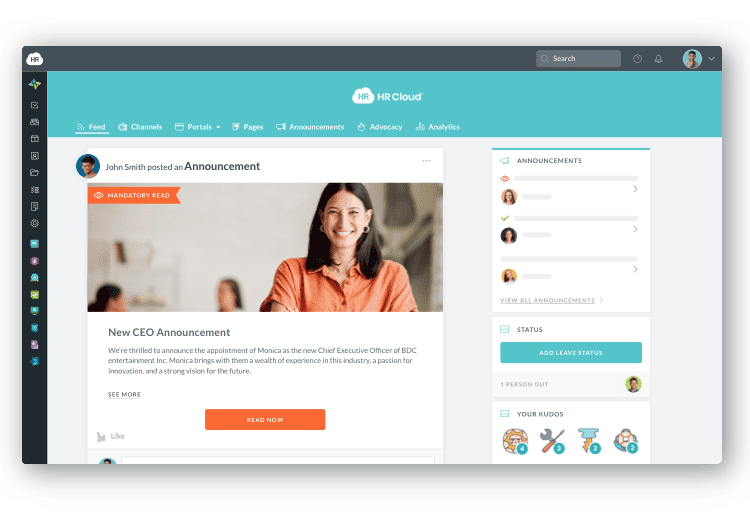
Having a Positive Work Environment
A positive hospitality workplace that fosters employee engagement in hospitality will encourage employee retention. This business should have an environment that promotes teamwork and an internal communication system. Regular team-building exercises are an excellent way to promote a culture of transparency and communication with teammates. It is essential for employees to feel their work is valued and that their opinions matter. Focusing on operational efficiency and enhancing the overall employee experience can contribute to a more positive work environment. Our solution, Workmates, offers positive team engagement for simplified communication across your team.
Staff Communication
Open communication channels allow employees to express areas of concern and seek clarification from team members. When HR professionals encourage a culture that is feedback friendly, they are also encouraging employee retention. Employees should always feel more than comfortable expressing opinions without fear of retaliation. When HR professionals address concerns in the workplace promptly, they are less likely to escalate, and employees will be left feeling that their concerns are valued.
Employee Recognition
Recognizing the efforts and contributions hospitality workers make to their place of work will boost overall employee morale, motivation to work, and satisfaction in their jobs. Recognizing employees' efforts helps create a positive hospitality workplace, as employees feel appreciated for their work in more ways than just a paycheck. Recognition programs are a great way to ensure employees have the opportunity to feel recognized. These programs can include an employee of the month or peer-to-peer recognition programs. By focusing on employee satisfaction and providing opportunities for continuous learning, businesses can further enhance their retention strategies.
Building a Diverse and Inclusive Workplace
A hospitality workplace that is both diverse and inclusive is crucial to keeping employees in the business. One way to do this is by creating policies and initiatives encouraging a respectful company culture. Job postings should always be free of bias to promote diversity in the recruitment process. Employees of all cultures and backgrounds should feel they belong in their place of work. Offering networking opportunities and flexible work schedules can also contribute to a more inclusive environment. Understanding why hospitality employees need to be able to relate to different types of people is essential in creating this inclusive atmosphere. This ability to connect with diverse individuals enhances customer service and fosters a more harmonious work environment, which is crucial in the hospitality industry where employees interact with a wide range of customers.
Employee Feedback
If you are looking for a tool to understand your employees’ needs in the workplace, conduct regular employee surveys. Surveys can find out about various aspects of working with a business. HR professionals can analyze this data to recognize any trends in responses and take action from there. Taking action can help to increase the survey response rate and employee retention.
Challenges of Employee Retention in the Hospitality Industry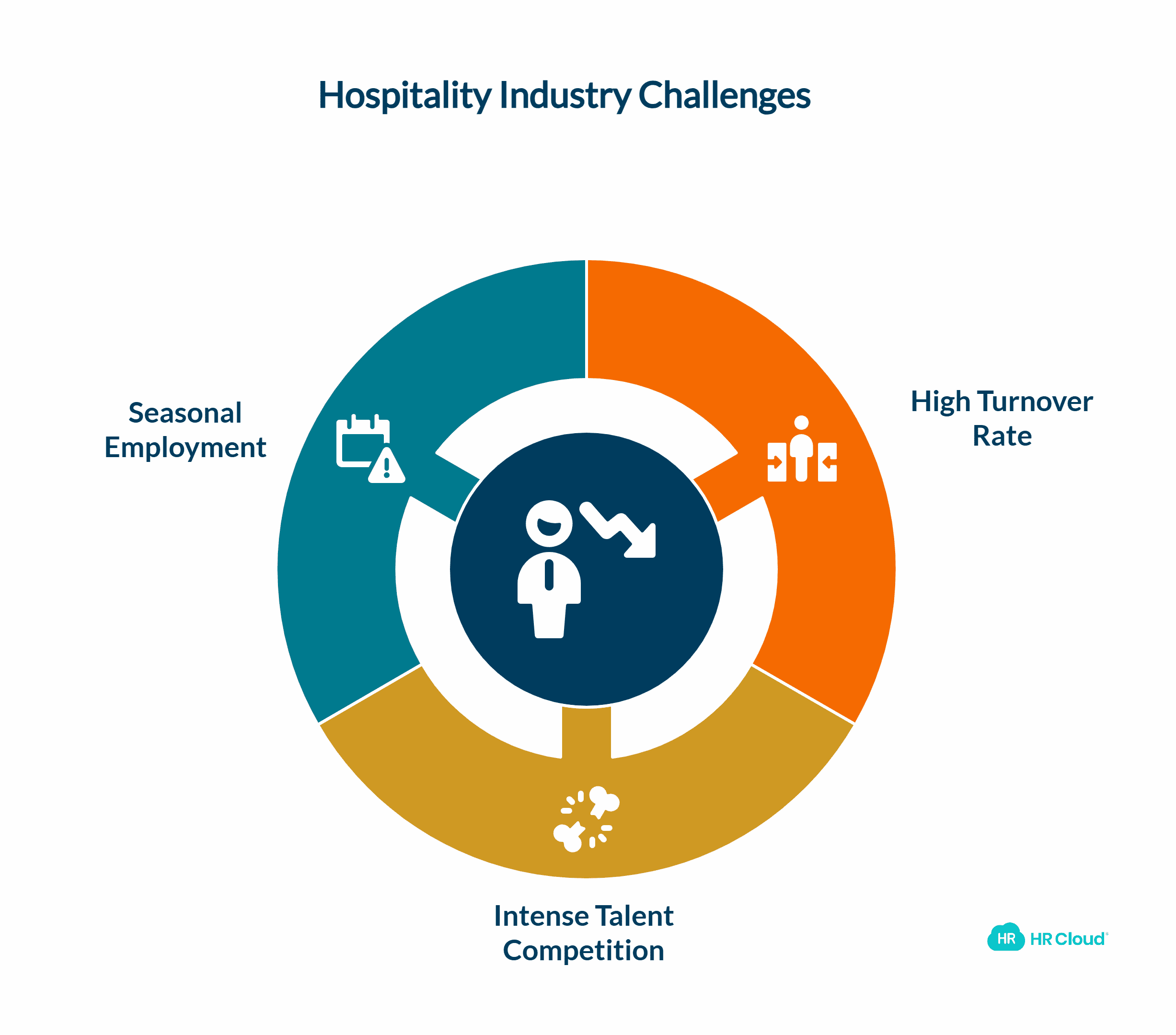
High Turnover Rate
Unfortunately, the hospitality industry has an exceedingly high employee turnover rate. The hospitality turnover rate in 2022 was particularly high, reaching unprecedented levels due to the ongoing effects of the pandemic. The hospitality turnover rate in 2023 continues to be a concern for many businesses, although there are signs of improvement as the industry adapts to new challenges. Employees working in businesses like restaurants and hotels often face long work hours, highly demanding schedules, and stressful environments that require labor-intensive tasks. These factors can lead to workers feeling burnt out from fatigue and a higher loss of employees. It's worth noting that in the restaurant business, the staff turnover rate is relatively lower compared to other hospitality sectors, but it remains a significant challenge for the industry as a whole.
A high turnover rate can significantly impact the satisfaction of your customers as they lose service from employees who are highly knowledgeable about the business and its processes. The relation can directly show a decline in service quality and satisfaction of customers.
Intense Talent Competition
In the hospitality industry, there is always intense competition between nearby businesses providing the same services, especially those in densely populated areas. Frequently, the supply of skilled hospitality workers with knowledge of hotel operations systems, booking engines, and foreign languages exceeds the demand of the market. This need for more available workers can be particularly noticeable in job openings for chefs, managers, and front-line staff. Remote and rural areas may also find hiring qualified candidates with specialized skills and experience challenging.
The hospitality industry often favors bilingual employees, as their businesses often serve customers from various countries and language backgrounds. Someone who is multilingual may find they have better job opportunities.
HR professionals should implement strategies to attract and retain a high-quality set of employees, thus contributing to the success of their hospitality establishments. Effective shift management and offering clear career growth opportunities can help address some of these challenges. Employee retention services can provide valuable support in developing and implementing these strategies.
Seasonal and Temporary Employment
Businesses operating in tourist areas may need help with seasonal employment. Many companies like hotels and restaurants, see various fluctuations in business throughout the year, which can require periods where the hiring team must expand the workforce. Seasonal jobs can create uncertainty for employees employed for only the off-season, causing them to seek more stable job options elsewhere. According to the U.S. Bureau of Labor Statistics, the summer months are busier for hospitality businesses. Many individuals can be hesitant to commit to only seasonal work, as they would rather have a career with rewards and growth opportunities.
A high employee turnover rate during peak seasons can cause businesses to spend a lot of time and money recruiting and hiring. HR professionals should be clear to seasonal employees about the expectations of their position and provide an incentive for them to return for the following peak season. Understanding how often the hospitality industry must be open and available is crucial for managing these seasonal fluctuations and maintaining a stable workforce. The 24/7 nature of many hospitality businesses adds another layer of complexity to staffing and retention strategies, as employees often need to work unconventional hours to meet customer demands.
Success Through Retention: Concluding Thoughts 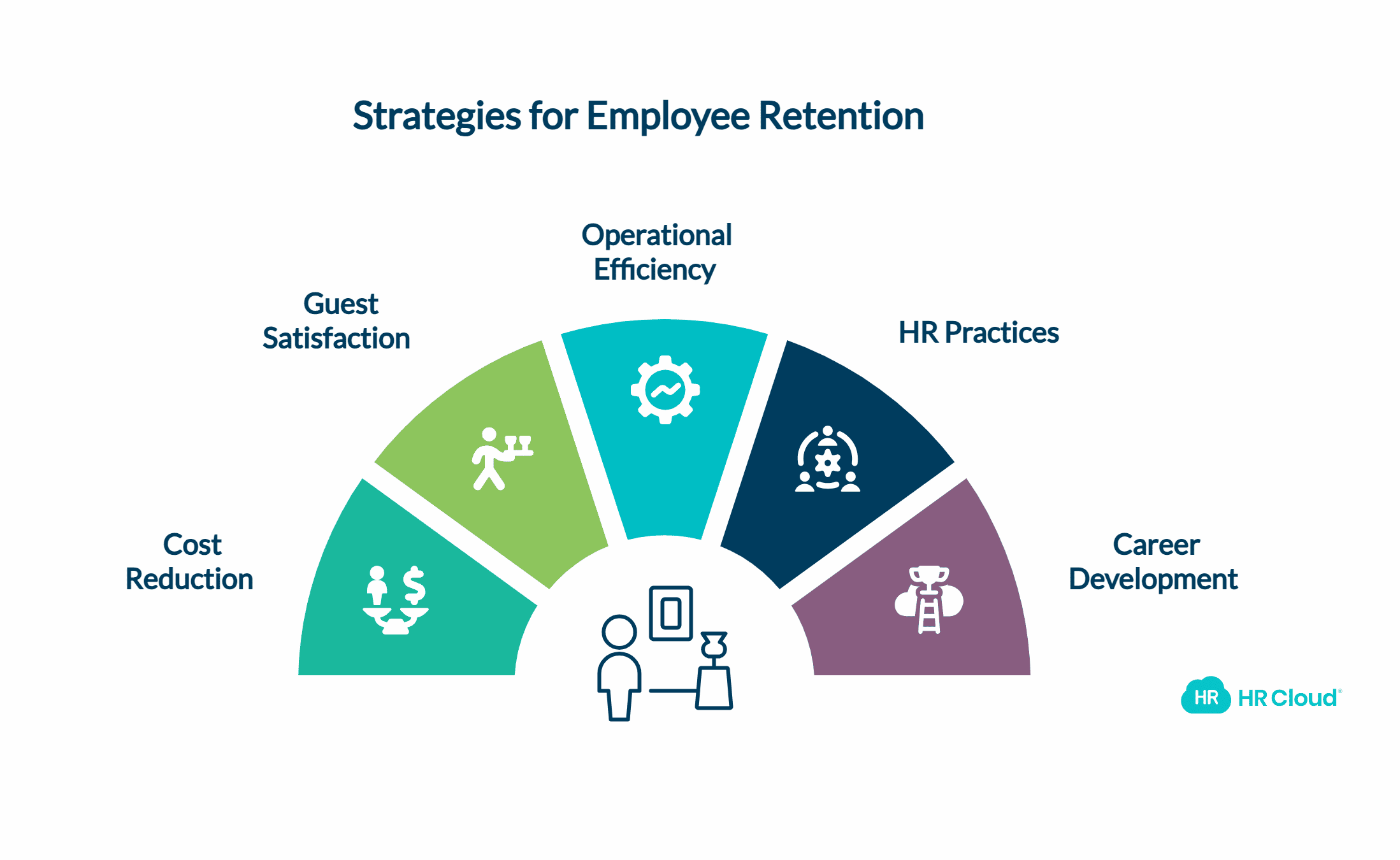
Implementing effective employee retention strategies is crucial for a successful business in the hospitality industry. This industry relies on highly skilled and experienced workers as a sure way to deliver excellent service to its customers.
A higher employee turnover rate can benefit a business, leading to higher costs related to recruitment and training, a lower rate of guest satisfaction, and significant disruptions to the flow of operations.
By recognizing the challenges and importance of employee retention in the hospitality industry, HR professionals can lower the employee turnover rate and improve their workforce's loyalty. Understanding the key to being successful in the hospitality industry and implementing the best HR practices in the hospitality industry can significantly improve retention rates and overall business performance. Focusing on internal promotions and providing clear career path mapping can further enhance employee retention and satisfaction.
FAQs
1. What is a good employee retention rate in the hospitality industry?
A healthy retention rate in hospitality typically ranges between 70%–90% annually. With an industry average turnover of around 70%–80% per year, a rate above 70% is considered strong.
2. How can hospitality businesses improve employee retention?
Key strategies include: offering competitive compensation and benefits, career growth opportunities, robust recognition programs, fostering a positive work culture, and ensuring open communication—all proven to reduce turnover.
3. What are the main causes of high turnover in hospitality?
Primary drivers include stress and burnout due to long hours and demanding environments, poor work–life balance, inadequate career progression, and weak management practices.
4. What role does management quality play in retaining staff?
Leadership is crucial—75% of voluntary turnover is driven by managerial factors. Good leadership, clear expectations, effective delegation, and proper recognition significantly reduce turnover.
5. How does work‑life balance affect retention in hospitality?
Flexible scheduling and wellness-focused policies—like sabbaticals, flextime, or shift flexibility—help prevent burnout and show employees that their well‑being is valued, which boosts retention.
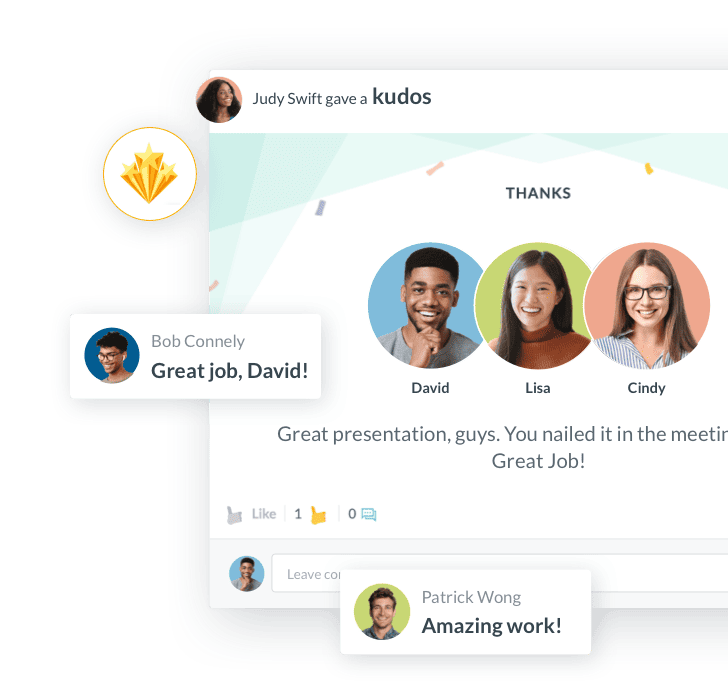

Author Bio:
This article is written by a marketing team member at HR Cloud. HR Cloud is a leading provider of proven HR solutions, including recruiting software, onboarding, employee communications & engagement, and rewards & recognition. Our user-friendly software increases employee productivity, delivers time and cost savings, and minimizes compliance risk.
Keep Reading
Best Onboarding Practices for Manufacturing Companies: 15 Proven Tactics That Boost Retention
"Three simple changes to our onboarding process cut our 30-day turnover from 28% to 12%.
Equity in the Workplace: A Practical Guide to Building Fairness and Opportunity
Workplace equity shouldn't be an aspiration—it should be the foundation of how
7 Employee Relations Responsibilities That Transform Workplace Culture
Employee relations shapes how people experience work every single day. It's not just
Like What You Hear?
We'd love to chat with you more about how HR Cloud® can support your business's HR needs. Book Your Free Demo

Build a Culture of Recognition. Boost Engagement. Guaranteed.
Workmates empowers employees to stay informed, connected, and appreciated—whether they’re on the front line, in the office, or remote. Recognition drives 12x higher engagement.Trusted by industry leaders in every sector




Cut Onboarding Costs by 60%.
Take the confusion and follow-ups out of onboarding with automated workflows, digital forms, and structured portals—so new hires ramp faster 3X quicker.Trusted by industry leaders in every sector




